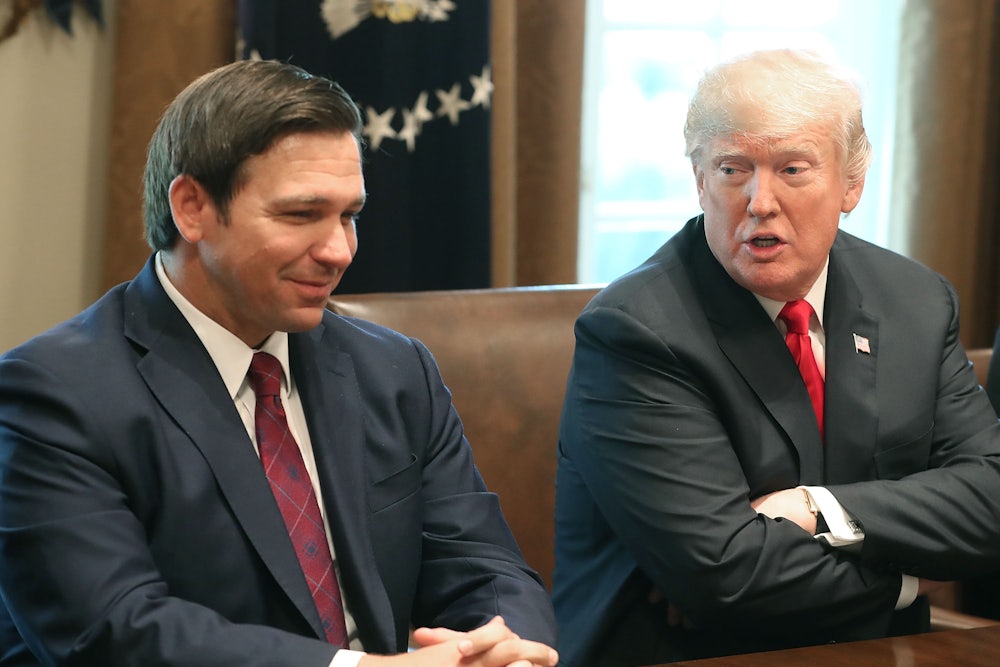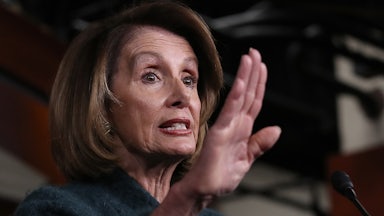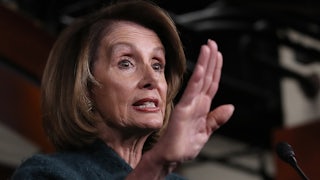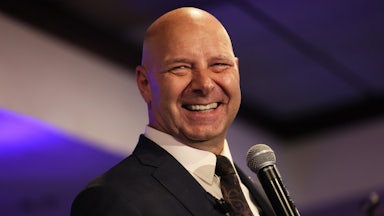On its very succinct website, the Ready for Ron PAC, which is currently building the email list that will eventually fuel a Ron DeSantis presidential run, tells potential donors that “the America-First Agenda must be revived” and promises the Florida governor is destined to be “the next great American president—like Ronald Reagan and Donald Trump.”
These superfans may be getting ahead of themselves. The Florida governor still has to prove himself by winning his own reelection battle in November, after which he can set his gaze more firmly on larger political ambitions. Nevertheless, political wisdom currently holds that a primary battle between DeSantis and Trump is likely to emerge in the post-midterm landscape. And unfortunately for DeSantis, Trump also considers himself to be the “next great American president,” recently noting that even if he is indicted, he would have “no prohibition against running.” At his rallies Trump gets downright giddy when teasing a 2024 run. He hits it as an applause line: “We may just have to do it again.”
Trump can draw some satisfaction from the fact that polling has shown him with a double-digit lead over DeSantis for the last year. In the 2022 Conservative Political Action Conference straw poll, which was held in Orlando on DeSantis’s turf, Trump led DeSantis by 34 points. But there are occasional outliers—a USA Today poll from July showing Trump holding only a nine-point lead over DeSantis and another, more recent, poll by the same group showing Florida voters favoring their governor over the Mar-a-Lago resident—that suggest these advantages aren’t impervious.
Democrats watching this emerging rivalry are far more fearful of a DeSantis presidential nomination than they are of a Trump retread. The former president is mired in an array of political and legal scandals. Weighed down by his ego, he sinks deeper into derangement each time he opens his mouth or his Truth Social app. A sizable chunk of the Republican base is exhausted with him. But while his recent vulnerabilities might make him a more alluring opponent for Biden to face, having already dispatched him once, the age-old Trump caveat that went ignored in 2016 remains—you can never count him out. And Democrats are well aware that another Trump presidency may finally topple the democratic system that he left wobbling. For the left, Trump versus DeSantis is the ultimate version of political pick your poison.
Yet Democrats have spent the 2022 midterm cycle excitedly picking that poison, even as they highlight the doom that Trump and like-minded Republican candidates would spell to America’s democracy. Groups affiliated with the Democratic Party have spent tens of millions of dollars elevating pro-Trump candidates over more moderate Republicans in primaries around the country. The arguments surrounding this strategy are obvious—those supporting the tactic say they are making safe bets. To their minds, close races can be transformed into potential Democratic gains when detestable Republicans—like Darren Bailey in Illinois, who has said that “the attempted extermination of the Jews of World War II doesn’t even compare on a shadow of the life that has been lost with abortion since its legalization”—are boosted above more palatable options.
This bet could pay off handsomely this November. Until then, however, those who fret that the party’s decision to help extreme Republican candidates win their primaries may backfire badly still have a compelling argument. The candidates that Democrats have elevated in this fashion are vile, authoritarian-minded Trump acolytes who, almost to a man, have denied the results of the 2020 election. They are dangers to democracy. They espouse draconian positions on abortion and traffic in conspiracy theories. It’s a sign of America’s decline that it was even possible to prop up such candidates in the first place. And in a midterm election, in which the historical trends tend to swing hard against the party holding the White House, Democrats have really played with fire.
The tactic also cuts against Democratic messaging designed to persuade the American people that these Republicans are uniquely dangerous. In Pennsylvania, where President Biden recently gave a speech about the GOP’s turn toward “semi-fascism,” the Democrats boosted Doug Mastriano, who bused his supporters to the January 6, 2021, insurrection. In Michigan, they supported a candidate who participated in the online Satanic panic of the Pizzagate era. It can be difficult to justify giving these sorts of politicians any kind of boost. Some Democrats haven’t: Representative Dean Phillips said that he was “disgusted” by the tactic; Representative Stephanie Murphy called it “mind-blowing.”
But critics can at least take solace in the fact that this nerve-racking political game is at an end. Where the upcoming presidential primary is concerned, Democrats are far more reluctant to play eleven-dimensional chess. While there is intraparty disagreement over the tactic of backing pro-Trump candidates at the state level, Democrats are universally of the opinion that they should not play such games in 2024 or do anything to aid Donald Trump once the presidential pre-primary season kicks off in earnest, even if they fear DeSantis more.
The Democratic strategists who spoke with me say that as far as the meddling in the 2022 Republican primaries is concerned, these were strategic decisions, informed by polling and voter registration data. But they’re fully aware that Donald Trump has made a mockery of the American political junkies’ polling obsession. They also presume that if he is elected president in 2024, he will work to ensure it is the last legitimate election America ever witnesses. And while he may be an insincere authoritarian claiming a monopoly on patriotism, Democrats understand that authoritarianism flying the flag of patriotism has a long history of unlikely success.
And so Democrats’ love of electoral game theory won’t extend to boosting Trump over DeSantis, even if they privately fear DeSantis may be the worse of two evils. Rather, liberals share a widespread opinion that they should simply play up their own policies and their own victories. Longtime Democratic strategist Jesse Ferguson told The New Republic, “The next 18 months is going to be these folks competing to win some right-wing fever swamp, and that sets up a contrast to Democrats, who are actually doing things that matter to people. So while the public is seeing a glorified wrestling match on one side, they can see the other side actually focused on the right issues, and that’s a powerful setup for the general election.”
Unlike the conscious meddling in Republican primaries, this is an easier tactic to justify. While Republicans get bogged down in the sandbox of the culture war—Lindsey Graham’s nationwide abortion ban, Ron DeSantis trafficking migrants—Democrats say they can make a strong case that they have improved the lives of Americans. The Inflation Reduction Act caps costs for Medicare recipients at $2,000 per year and sets a $35-per-month cap on insulin for seniors. On the back of the Bipartisan Infrastructure Act, Biden has claimed his administration will begin repairing 65,000 miles of highway and 1,500 bridges in 2022. Millions of young Americans are getting the student loan bailout they’ve desperately needed. How does tricking 50 desperate refugees into a one-way plane ride to Martha’s Vineyard compare in terms of making things better for anybody?
This “glorified wrestling match” of a Republican presidential primary is already beginning to mirror the 2016 contest, in which Donald Trump fattened his campaign on the outrage of Democrats and the media. Democratic strategist Lis Smith told The New Republic that Democrats should simply stay out of any fray that emerges between Trump, DeSantis, or another Republican contender. “It’s clear that DeSantis has studied Trump’s tactics and is sort of building on them,” she said. “I think it’s much more important to talk about the tangible things Democrats are doing to improve people’s lives than to get caught up in the Trump-DeSantis freak show. Ron DeSantis can’t be the ringmaster if Democrats don’t show up to the circus.”
That Trump-DeSantis freak show hasn’t fully taken off, at least not yet. Their rivalry remains a cold war, punctuated with occasional reports of Trump’s growing annoyance toward his would-be usurper. Trump has yet even to publicly brand DeSantis with a nickname. But DeSantis—whom The New Yorker referred to as “Donald Trump with a brain”—knows that he could, at some point, get drawn into 2024’s version of the petty schoolyard scuffle that characterized the 2016 GOP primary. And the Florida governor has probably figured out that Trump is unlikely to accept a primary defeat. Starved of power and driven mostly by anger toward his believed adversaries, the former president is visibly desperate. And as his legal troubles threaten his freedom and his livelihood, Trump may regard a presidential campaign, and a return to the Oval Office, as his only refuge.
The curtain will eventually rise on that particular carnival act. For now, DeSantis and Trump both need Democrats as their foil. But with the midterms only weeks away, Democrats have resisted dragging these two Republican adversaries into their own campaign rhetoric. Smith notes that history suggests that this is the shrewdest move: “The two election cycles where Democrats have had the most success recently were 2018 and 2020,” she said. “It wasn’t that they were running anti-Trump ads or going out there to say the most hyperbolic things about Donald Trump. No, they were running ads about things like Obamacare and wages and jobs.”
True to form, the DNC’s late-summer ad buy focused on Democratic accomplishments. Before that, they ran a messaging campaign attacking the Republicans’ widely unpopular views on abortion—a narrative to which they have eagerly returned. This is where they can win, Democrats say, and they are still very much about winning elections. But if this is the most advantageous territory for Democrats, why did they spend so much of the primary season meddling in GOP contests? For her part, House Speaker Nancy Pelosi has defended the Democratic tactic of boosting pro-Trump Republicans in the primary, saying, “The political decisions that are made out there, are made in furtherance of our winning the election.”
Maybe Democrats are correct that backing extreme candidates with dangerous authoritarian delusions in the midterm primaries is the best way to ensure they’d hold onto power—or at least hold down their losses—after the dust settles on election night. Maybe the next two election cycles will be another damning referendum on Trumpism. But remember, Doug Mastriano—a beneficiary of Democratic largesse—believes in outlawing abortion under all circumstances, including rape and incest. If he wins, his far-right ideology will affect the lives of countless unknown women from Philadelphia to Erie. Sure, maybe he will lose; he’s certainly not polling well. Maybe it’s OK that the Democrats have wagered in this fashion with people’s lives. Maybe it’s not. But it’s telling that as the midterm election gives way to a potential tilt between Trump and DeSantis, Democrats’ appetite for this sort of skulduggery is waning. And maybe that’s for the best.










